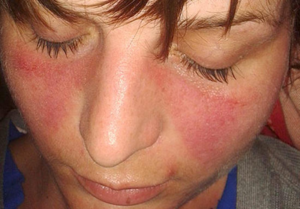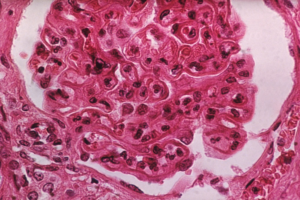Lupus Serum Plasma and FFPE Samples
Bay Biosciences provides high quality, clinical grade, biopsy tissue samples, FFPE tissue blocks with matched cryogenically preserved sera (serum), plasma, peripheral blood mononuclear cells (PBMC) biofluid samples from patients diagnosed with systemic lupus erythematosus (SLE).
Moreover, the serum, plasma and PBMCs are processed from SLE patient’s peripheral whole-blood using customized collection and processing protocols.
Furthermore, biopsy tissue and matched biofluid samples are collected from unique patients diagnosed with SLE and are provided to a valued pharmaceutical customer for research, discovery and drug development.
In addition, detailed clinical information associated with SLE specimens is provided to a valued customer for research, development and drug discovery.
Systemic Lupus Erythematosus (SLE) Overview

Consequently, systemic lupus erythematosus (SLE) symptoms can vary and can change over time. In fact, most common symptoms include anemia, blood clotting, severe fatigue, headaches, hair loss, joint pain, swelling, rash on the cheeks and nose. Moreover, other symptoms depend on the part of the body the disease is attacking.

Signs and Symptoms of Systemic Lupus Erythematosus (SLE)
The signs and symptoms of Systemic lupus erythematosus (SLE) can vary from person to person; moreover, they may come and go, depending on what part of the body is affected. Additionally, these symptoms can be mild, moderate, or severe. For instance, some patients have just a few symptoms, while others experience many; thus, symptoms can vary and change over time. Consequently, diagnosis can be difficult because lupus mimics many other diseases; therefore, it requires clinical and serologic criteria.
Following are the common symptoms of Systemic lupus erythematosus (SLE):
- Firstly, anemia
- Secondly, severe fatigue
- Thirdly, fingers turning white or blue and tingling when cold, which is known as Raynaud’s phenomenon
- Moreover, joint pain
- Furthermore, joint swelling
- Next, headaches
- In addition, a rash on the cheeks and nose, which is called a “butterfly rash”
- Also, hair Loss
- And, fever
- As a result, mouth sores
- Likewise, photosensitivity
- For example, inflammation of the membranes that surround the lungs (Pleuritis)
- Lastly, inflammation of the pericardium, which is the fibrous sac surrounding the heart (Pericarditis)
- Finally, blood clotting problems
Furthermore, other symptoms depend on the part of the body the disease is attacking; for example, this includes the digestive tract or the skin. In addition, other symptoms can include sun sensitivity, oral ulcers, arthritis, lung problems, heart problems, kidney problems, seizures, psychosis, and blood cell and immunological abnormalities.
Causes of Systemic Lupus Erythematosus (SLE)
The cause of Systemic lupus erythematosus (SLE) is not clearly known. Nevertheless, it’s thought to be the result of a mix of genetic, hormonal, and environmental factors.
For example, the immune system makes proteins called antibodies that fight infection. In contrast, in lupus, the body also makes autoantibodies that are similar but attack the body’s own tissues instead (autoimmune).
Consequently, it is unknown why this happens. Furthermore, there are some factors that probably make this more likely:
- First, an illness or infection
- Second, strong sunlight
- Moreover, hormonal changes, such as during puberty
- Furthermore, smoking cigarettes
- Finally, certain medications; this is known as drug-induced lupus, and this usually gets better when patients come off the medication that caused it.
In addition, lupus isn’t directly passed on from a parent to their children. However, if you have a close relative with lupus, then you may be at increased risk of developing it.
Moreover, Systemic lupus erythematosus (SLE) is more common in women than men by nearly 10 to 1. Specifically, it may occur at any age. However, it appears most often in young women between the ages of 15 and 44.
In particular, in the US, the disease is more common in African Americans, Asian Americans, African Caribbean’s, and Hispanic Americans. Finally, lupus isn’t contagious so you can’t catch it from anyone else.
Biospecimens
Bay Biosciences is a global leader in providing researchers with high quality, clinical grade, fully characterized human tissue samples, bio-specimens, and human bio-fluid collections.
Moreover, human biospecimens are available including tumor tissue, serum, plasma and PBMC Samples from most other therapeutic areas.
Furthermore, Bay Biosciences maintains and manages its own biorepository, the human tissue bank (biobank) consisting of thousands of diseased samples (specimens) and likewise normal healthy donors for controls. Additionally, available in all formats and types.
In fact, our biobank procures and stores fully consented, de-identified and institutional review boards (IRB) approved human tissue samples, human biofluids such as serum samples, plasma samples from various diseases and matched controls.
Also, all our human tissue collections, human biospecimens and human biofluids are provided with detailed, samples associated patient’s clinical data.
In fact, this critical patient’s clinical data includes information relating to their past and current disease, treatment history, lifestyle choices, biomarkers, and genetic information.
Additionally, researchers find the patient’s data associated with the human biospecimens extremely valuable and use it to help identify new effective treatments (drug discovery & development) in oncology, as well as in other therapeutic areas and diseases.
Bay Biosciences banks wide variety of human tissue samples and human biological samples, including fresh frozen human biospecimens cryogenically preserved at – 80°C.
For example fresh frozen tissue samples, tumor tissue samples, formalin-fixed paraffin-embedded (FFPE), tissue slides, with matching human bio-fluids, whole blood and blood-derived products such as human serum, human plasma and human PBMCs.
Bay Biosciences is a global leader in collecting and providing human tissue samples according to the specified requirements and customized, tailor-made collection protocols.
Please contact us anytime to discuss your special research projects and customized human tissue sample requirements.
Types of Biospecimens
Bay Biosciences provides human tissue samples (human specimens) and human bio-fluids from diseased and normal healthy donors which includes:
- Firstly, peripheral whole-blood
- Secondly, amniotic fluid
- Thirdly, bronchoalveolar lavage fluid (BAL)
- Next, sputum
- Also, pleural effusion
- Moreover, cerebrospinal fluid (CSF)
- Likewise, serum (sera)
- In addition, plasma
- Moreover, peripheral blood mononuclear cells (PBMC)
- Furthermore, saliva
- Next, buffy coat
- Accordingly, urine
- For example, Stool samples
- Also, aqueous humor
- And, vitreous humor
- Lastly, kidney stones (renal calculi)
- Finally, other bodily fluids from most diseases including cancer.
Moreover, we can also procure most human biospecimens and human biofluids, special collections and requests for human samples that are difficult to find. All our human tissue samples and human biofluids are procured through IRB-approved clinical protocols and procedures.
In addition to the standard processing protocols, Bay Biosciences can also provide human biofluids such as human plasma, human serum, and human PBMCs bio-fluid samples using custom processing protocols. you buy donor-specific collections in higher volumes and specified sample aliquots from us in multiple format and sets.
Bay Biosciences also provides human biospecimens from normal healthy donors; volunteers, for controls and clinical research, Contact us Now.
- 日本のお客様は、ベイバイオサイエンスジャパンBay Biosciences Japanまたはhttp://baybiosciences-jp.com/contact/までご連絡ください。